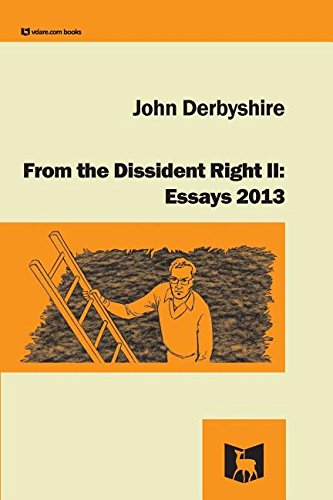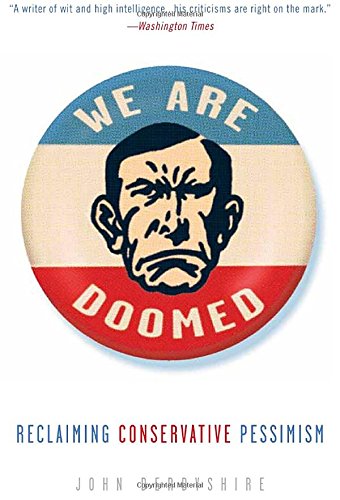◄►◄❌►▲ ▼▲▼ • B下一个新评论下一个新回复了解更多
前几天,在《街角》上,为了纪念科幻作家罗伯特·A·海因莱因诞辰一百周年,我 发布 海因莱因 (Heinlein) 对 1950 世纪 XNUMX 年代广播系列节目“This I Believe”的贡献。
海因莱因避开任何宗教或形而上学的肯定,阐述了他的观点 社交、 信条:
我相信我的邻居……我的市民……我的同胞。”他接着写到了当地的牧师,他的“善良、慈善和慈爱在他的日常行为中闪耀……如果我遇到麻烦,我会去找他。” (顺便说一下,海因莱因是一位无神论者。)他告诉我们,海因莱因的隔壁邻居是一名兽医:“医生会在辛苦一天后起床帮助一只流浪猫——不收费,也不可能收费。” 。
海因莱因接着赞扬了他的同胞们的仁慈和尽责:“对于那些说‘管你的,我有我的’的人来说,有一百、一千个人会说,‘当然,朋友, 坐下。'我知道,尽管有所有关于搭便车的警告,我仍然可以走到高速公路上,拇指搭车,几分钟后,一辆汽车或一辆卡车就会停下来,有人会说,“爬进去,麦克。”你要走多远? ……我相信工人的诚实技艺。看看你周围。从来没有足够的老板来检查所有这些工作。从独立厅到大古力大坝,这些东西都是由骨子里诚实的工匠建造的,水平而方正。”
海因莱因甚至还对政治家说了一句好话:“我相信几乎所有的政治家都是诚实的。每一个受贿的市议员,都有数百名政客——低薪或根本没有薪水——尽最大努力让我们的系统运转起来,没有感谢或荣耀。如果这不是真的,我们就永远无法越过十三个殖民地。”
那个角落发帖带来的读者电子邮件比平均十个专栏还要多。我刚刚经历了这一切。我很遗憾地说,总体基调相当尖酸刻薄。读者X代表:
德比郡先生:
- 如今,大多数美国人不太可能见到甚至认识牧师。你只是在周围看不到很多东西。当地神父参与社区事务的日子早已一去不复返了,神父们也一样。
- 大多数人的邻居都没有医生。医生现在住在高档社区,尽可能远离乌合之众。
- 这些诚实的工人现在讲西班牙语,住在镇上破旧地区的破旧公寓里。
- 低薪政治家已经消失了。致富最可靠的途径是政治,其次是政府服务。这些人也不常住在城里。他们和医生住在镇上的某个地方。
- 如今,一个流行小说作家永远无法写出这样的文章。他对工人、教师、城镇居民等了解不多。他会在医生和政治家旁边有一栋大房子。他们会在鸡尾酒会上谈论镇上的乌合之众如何不允许他们的仆人成为公民。
你会注意到这里有一个主题。我怀疑旧秩序崩溃的原因是新秩序允许精英离开城镇。一旦他们卸下了与人混合的任务 海波洛伊,旧秩序对任何人,尤其是精英来说,没有多大用处。
我认为读者 X 过分要求布丁了,但他说得有道理。二战后的精英统治最终发生了动摇,出现了一种社会分离,一种社会分离。 色谱法。当然,美国一直都有精英,但我们也一直有某种下层阶级。不过,现在两者似乎都比当时大得多。此外,如果你减去海因莱因时代的精英和下层阶级,剩下的——大中产阶级——当时比现在更加同质化,其成员彼此更加熟悉。 (例如)医生和(例如)警察之间的社交距离当时比现在更小。
In 稍后的帖子,我对 Heinlein 的文章如何让 1950 世纪 XNUMX 年代看起来像是很久以前的事情做了一些明显的后续评论:
我对许多人表示广泛的同情,他们认为 1950 世纪 XNUMX 年代是美国文明的黄金时代,有许多明显的条件。我们到底发生了什么?
那么, 大破坏 发生了。一个具有许多令人不满意的特征的旧秩序结束了,而一个新的秩序——也有许多令人不满意的特征,但不同的大多是不令人满意的程度较轻——出现了。
1950 世纪 XNUMX 年代对我们很多人来说如此美好的主要原因是,在从旧秩序转向新秩序的过程中,我们失去了很多文明自信。你可能会说这种信心是错误的,或者是一种幻觉。你甚至可能会说这是令人讨厌的,最好摆脱它。你可能在所有观点上都是对的。不过,文明自信有一些非常有吸引力的东西。就像纯真一样,一旦消失就无法挽回。我们这些记得它的人不应该因为错过它而受到责备。
这里的重点是 “社会资本” 海因莱因描述说,睦邻互助、俱乐部网络、协会、友好社团和志愿者组织将社区凝聚在一起,是支撑文明信心的关键。
---------
除了大颠覆之外,发生的另一件事是多样性。这通过三种方式降临到我们身上。
首先,是纠正种族不公正——废除合法的种族隔离,以及羞辱吉姆·克劳和他的北方表兄弟*。其次,1965年的《移民法》结束了长达40年的近乎暂停的移民政策,并废除了对欧洲人的旧有优惠。第三,从 1970 世纪 XNUMX 年代末开始,墨西哥人和中美洲人越过南部边境不受控制地流动。
海因莱因本人似乎没有种族偏见,就像他那个时代的任何人一样自由。 (仅在最后 星河战队 不过,海因莱因笔下的美国有 90% 是欧洲白人,10% 是非洲黑人,在四舍五入误差水平上是“其他”。由于在大多数地方和工作类别中,黑人与白人的竞争并不激烈,而且主要居住在自己所在的城镇地区,因此美国白人很容易将他们视为本质上的黑人。 无形.
从这个意义上说,海因莱因领导下的美国虽然严格来说是多种族的,但并不多元化。从 12 岁到 16 岁——也就是说,从 1957 年到 1961 年——我只读科幻小说,读的东西太多了。其中大部分是美国人;大多数涉及想象的未来;大多数想象中的未来——包括海因莱因的菲律宾人——完全是欧洲白人。
With the coming of diversity, much changed. Some of it changed for the better — especially if you were a capable black American, or an impoverished Mexican peasant. One thing that changed for the worse was, that we lost much of the easy neighborliness of Heinlein’s essay. It is a regrettable fact that the sense of common interest, common citizenship, and mutual support that Heinlein describes in his (essentially) monocultural and monoracial America is much reduced in a diverse society.
The most recent person to learn this has been Harvard political scientist 罗伯特·普特南, whose researches into “social capital” have led him to conclude what, as a left-liberal, he was desperately reluctant to conclude: that diversity and social capital are 反比例: more diversity, less social capital.
---------
Reader Y brought to my attention the following passage from James Baldwin’s 1956 novel 乔凡尼的房间, which is about homosexual life in the Paris of that time:
Nobody stays in the garden of Eden. Jacques’ garden was not the same as Giovanni’s, of course. Jacques’ garden was involved with football players and Giovanni’s was involved with maidens — but that seems to have made little difference. Perhaps everybody has a garden of Eden, I don’t know; but they have scarcely seen their garden before they see the flaming sword. Then, perhaps, life only offers the choice of remembering the garden or forgetting it. Either, or: it takes strength to remember, it takes another kind of strength to forget, it takes a hero to do both. People who remember court madness through pain, the pain of the perpetually recurring death of their innocence; people who forget court another kind of madness, the madness of the denial of pain and the hatred of innocence; and the world is mostly divided between madmen who remember and madmen who forget. Heroes are rare.
Reader Y adds the following comment: “In the context of your remark, the 1950s would be ‘Eden,’ conservatives would be those going mad with the pain of perpetually remembering that Eden, and liberals would be those going mad by trying to forget it.”
This reader too, I think, somewhat overstates his case. Thoughtful, well-read conservatives (is there any other kind?) will readily tick off some of the huge 1950s negatives: union power, 97 percent top income-tax rates, environmental despoliation, Jim Crow, female talent and energy stifled in housewifery, and so on. In the matter of social capital, though — the subject of Heinlein’s essay — the 1950s were indeed an Eden.
There are few places in the U.S.A. today where people feel like that now. Not none, but few. I drive a good deal, in town and country, but I can’t recall the last time I saw a hitchhiker. If I did see one, I would not pick him up. (Come to think of it, it’s been a long time since I heard an American address a stranger as “Mack.”)
---------
Watching the recent furor over the Senate immigration bill, I found myself wondering if this was perhaps a first in U.S. history: a sort of 农民起义 against the now-enormous and massively-entrenched (and increasingly endogamous) elites. It has long been a commonplace, confirmed over and over again by 民意调查, that the elite-commoner gap on the immigration issue is wider than on any other.
It may be that this is only the first of many such issues. As the elites pull away from the rest of us, and the rest of us become more atomized and disorganized — “a heap of loose sand” in 孙中山难忘的一句话 关于晚帝国的中国人——我们可能会走向迈克尔·杨在他 1958 年的书中预测的那种顽固的精英平民敌意 精英主义的兴起. 我不认为在当前对政治阶层的普遍愤怒中看到这一点是空想的——总统的支持率在 30 年代下降,而国会的支持率更低。
Some of that is anger at particular policies — Iraq, the immigration bill. Much, though — a rising proportion, I believe — is systemic: a feeling that the elites are now running the show for their own interests, Latin-America-style, with not much regard for ours. As my reader X (see above) correctly observed: “The low paid politician has vanished. 致富最可靠的途径是政治,紧随其后的是政府服务。”
I think that is the right context in which to see the Scooter Libby semi-pardon. Just as friends don’t let friends drive drunk, elites don’t let elites do jail time.
The Libby case has of course a political dimension, with diehard Republicans mostly furious about the prosecution and diehard Democrats mostly happy. Outside the zone of the politically passionate, however, the whole Libby affair is seen in terms of (a) political high elites of 相反 tendencies using the law as a weapon in their power struggles, and (b) political high elites of 相同 tendencies taking good care of each other. (In Libby’s case, very good care indeed: “Republicans have raised millions of dollars for Libby’s defense,” we are 告诉.)
We are not far here from the attitude that so annoyed 利玛窦 when he tried to get political conversations going with commoners at wayside taverns in 16th-century Imperial China, only to be told: “Oh, that’s for the court officials to deal with among themselves. It doesn’t concern folk like us.” We are, on the other hand, uncomfortably far from the participatory structures of a free republic.
The mirror image of the Libby case is the prosecution of the two Border Patrol agents Ignacio Ramos and Jose Alonso Compean. As with the Libby prosecution, you can make a case here on the precise letter of the law (our own 安迪·麦卡锡(Andy McCarthy) has been assiduous in this regard on both cases), but to ordinary citizens reading of the offenses committed, and the progress of the prosecutions, both the Ramos-Compean and the Libby sentences seem absurdly disproportionate.
Why did President Bush use his clemency power, on exactly that basis, in the one case, but not the other? It is especially odd when you consider that Compean and Ramos are both from poor Mexican-immigrant backgrounds — a class of people for whom the president has expressed special favor and regard.
The answer is surely that Scooter Libby is one of the Big People, while Compean and Ramos belong to the Little People, who are of no account to elite panjandrums like George W. Bush. Our political system is now run by the Big People for their own interests. If they ever deign to notice the Little People, it is with disdain and contempt. Compean and Ramos? Why, they didn’t even go to law school!
This indifference, this disdain and contempt, is mostly hidden behind smokescreens of bogus “compassion” and ostentatious, self-serving religiosity — especially around election time. Elites know that when their group protectiveness shows itself openly through the smoke, it is greeted with widespread public disgust. (The approve/disapprove/don’t-know 数字 on the president’s decision to commute Scooter Libby’s sentence are 21/47/32.) They know, but they care less and less.
As the separating-out of our society continues — as we get ever closer to the Latin American model — our rulers will no longer need to bother with smokescreens. They will be able to attend to their self-interest undisturbed, as the elites to our south do, bribing or outwitting the commoners if discontent rises to uncomfortable levels — or perhaps, like Mexico’s current elite, just 出口 他们。
It’s a form of society, and it might be stable (or it might not — the narrator in 精英主义的兴起 is torn to pieces at last by a low-IQ mob). It’s a long way from the America of Robert A. Heinlein, though.
-------------------
* first lived in this country in the early 1970s, I was doing menial jobs, often alongside black Americans. I was fascinated by the folk wisdom they had concerning relations with whites, and among themselves. A catch-phrase I heard particularly often was: “In the South, you can get as close as you like, but don’t get too big. In the North, you can get as big as you like, but don’t get too close.” Another favorite: “If you’re white, all right; if you’re brown, stick aroun’; if you’re black, git back.” [NB: A reader tells me this second one shows up in a song by the blues singer Big Bill Broonzy http://en.wikipedia.org/wiki/Big_Bill_Broonzy. To be precise, says my reader, it “is taken from the chorus of a song by Big Bill Broonzy, called “Get Back.” Broonzy died in 1958. The song appears in the record Big Bill Broonzy Memorial (Mercury MG 20822, 1963), and the liner notes say “… it’s worth remembering that Bill sang this one some twenty years ago,” which would make it the early 1940’s. Whether the saying originated with Broonzy, or whether he was just retailing a proverb, I do not know.]

 RSS
RSS









